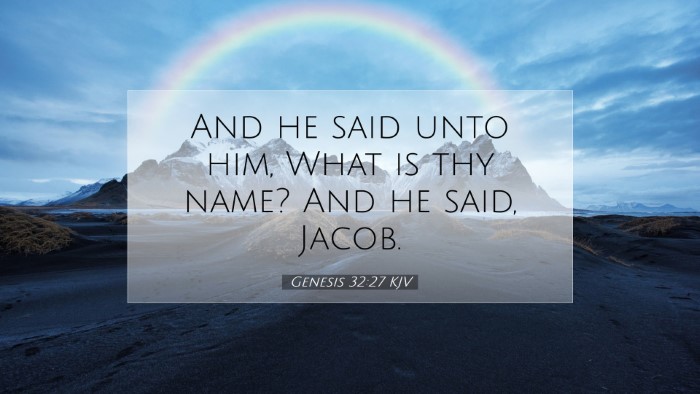Commentary on Genesis 32:27
Verse: Genesis 32:27 (KJV) - "And he said unto him, What is thy name? And he said, Jacob."
Introduction
This pivotal moment in the life of Jacob, occurring during a significant encounter with God, encapsulates themes of identity, transformation, and covenant. The dialogue between Jacob and the mysterious figure he wrestled adds depth to the narrative, underscoring both Jacob’s struggle and the divine purpose at work.
The Importance of the Question
God's Inquiry:
The question "What is thy name?" serves as a profound inquiry into Jacob's identity. Biblical names carry significant meaning, often reflective of one's character or circumstance. Here, Jacob identifies himself with his name, which means "supplanter" or "deceiver." This identification is not merely personal; it highlights his past actions and relationships, especially in how he dealt with his brother Esau.
Matthew Henry's Insight
Henry reflects on the notion that God is prompting Jacob to come face-to-face with his own nature. By answering with "Jacob," Jake acknowledges his past misdeeds and the deceit he has lived through. Each individual must confront their identity and acknowledge their shortcomings before God, a crucial step in spiritual growth.
Albert Barnes' Commentary
Barnes emphasizes the significance of this encounter as a moment of confession. Jacob's name signifies a life lived in striving and manipulation, representative of his challenges and failures. By stating his name, Jacob is, in essence, confessing his sinfulness and the struggles that have defined him.
The Nature of the Wrestler
The wrestling match between Jacob and the divine figure raises questions about the nature of God and His interaction with humanity. As this episode unfolds, it demonstrates God's willingness to engage deeply with humanity, drawing Jacob into a physical, intimate struggle.
Adam Clarke's Interpretation
Clarke notes that the verse elucidates the mystery of divine encounters. The wrestling implies not only a physical struggle but also an intellectual and spiritual one. Jacob's persistence in grappling symbolizes humanity's quest for divine assurance and transformation.
Theologians' Reflection
Scholars suggest that Jacob’s wrestling signifies a broader theological theme: the struggle of faith. Each believer contends with the divine, seeking clarity and conviction. Jacob’s story finds parallels in the journeys of many biblical figures who wrestle with their faith, showcasing God's openness to struggle.
Transformation Through Struggle
Identity Change:
Following this encounter, Jacob's identity is transformed. He is renamed Israel, which means "one who struggles with God." This critical transformation embodies the idea that genuine encounters with God lead to profound change.
Matthew Henry on Transformation
Henry remarks on the significance of Jacob's new name, emphasizing it as a marker of Jacob’s spiritual progression. The transition from Jacob, the deceiver, to Israel, the struggler, illustrates growth through trial—a vital lesson for believers who may face their battles.
Albert Barnes on New Beginnings
Barnes reinforces that new identities in Christ stem from engagement through struggle. Jacob's renaming is a divine affirmation of his new destiny, inviting readers to embrace their transformations following encounters with God.
Conclusion
The brief yet profound exchange captured in Genesis 32:27 provides rich material for reflection among pastors, students, theologians, and scholars. It underscores essential themes of identity, transformation, and the ongoing human-divine interaction.
As believers wrestle with their identities—acknowledging past struggles and sins—they are invited into a transformational relationship with God, who engages personally and meaningfully. This narrative encourages an understanding of faith characterized by struggle, assurance, and ultimately, identity renewal in light of God’s grace.


